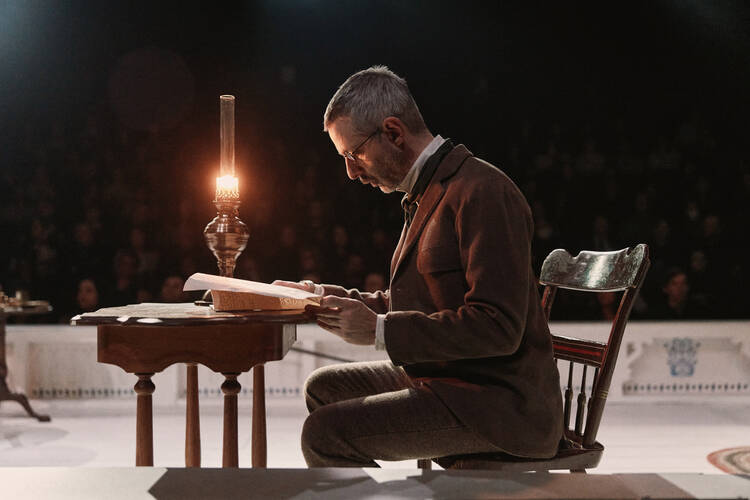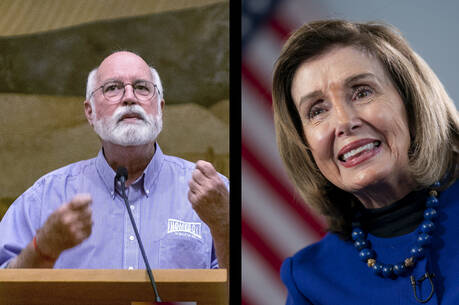In a 1903 letter to a colleague, the Russian dramatist Anton Chekhov gushed, “You know Ibsen is my favorite writer.” Apparently he was of two minds about the Norwegian playwright who had revolutionized Western drama in the previous few decades: Other colleagues record him as having been bored silly by the Moscow Art Theatre’s production of Ibsen’s “The Wild Duck,” despite its clear influence on his own masterpiece “The Seagull,” and even to have said—in an ironic echo of the shocked closing line of Ibsen’s “Hedda Gabler”—“Ibsen doesn’t know life. Things don’t happen that way in life.”
Two starry new Broadway productions cast these two towering figures in sharp relief, and put a fine point on the question of the way things happen in life: a lean, unsettling production of Ibsen’s polemical “An Enemy of the People,” starring Jeremy Strong (“Succession”) and Michael Imperioli (“The Sopranos”), and a chic but empty new staging, at Lincoln Center Theater, of Chekhov’s “Uncle Vanya,” starring Steve Carell (“The Office”) and William Jackson Harper (“The Good Place”). Those TV credits are not entirely misleading—HBO prestige dramas vs. smart network sitcoms—but they don’t tell the whole story of these canon reloads, nor why their impact feels blunted.
“An Enemy of the People” is the prototypical social issue play, the template for many an Arthur Miller drama (Miller himself did a popular adaptation) and paranoid thriller. It follows the single-minded Dr. Stockmann, who discovers that the water in the baths of his spa destination town is toxic but cannot convince the town’s self-interested leaders or its pigheaded populace to take any action to solve the problem. It’s a premise that rings clear bells in our age of climate change denial and vaccine skepticism, and as such runs the risk of mere pandering to well-heeled liberal fans of Dr. Fauci.
One of the best things about Amy Herzog’s streamlined adaptation is its clear discomfort with such easy resonances. She and director Sam Gold have kept the play in its period and allowed its contemporary relevance to speak for itself. And with Jeremy Strong in the lead, they’ve turned the play into more of a knotty character study than a rallying cry—all to the good in my book.
Strong’s Stockmann resembles Kendall Roy, the pathetic princeling of “Succession,” in his odd mix of neediness and stubborn isolation. He’s a man who desperately craves human contact but lacks social intelligence—a big problem for someone who must build support for the radical change he seeks. As his brother, the town’s mayor, Michael Imperioli is his polar opposite: self-possessed, politically savvy, coolly transactional.
The production around these two leads is similarly clear-eyed and unflappable: You may be moved by the spectacle of Stockmann’s equivocal defeat, but I doubt you’ll be stirred, even by the play’s involving in-the-round staging. Ultimately this new “Enemy” is a kind of Pyrrhic victory: a smart production of a play I honestly find a bit simple-minded.
“Uncle Vanya” also fails to catch fire, for somewhat opposite reasons. Heidi Schreck, who adapted the script, and director Lila Neugebauer have set Chekhov’s sad, beautiful meditation on middle-aged compromise in an unmistakably contemporary setting, with distracting rather than clarifying results. And where Herzog and Gold trimmed their play’s fat, Schreck and Neugebauer lean heavily into Chekhov’s languid, attenuated pace.
That approach might have worked with a more cohesive cast. I have seen “Uncle Vanya” in all kinds of settings, and the make-or-break element is usually the show’s ensemble chemistry. I’m sorry to report that Steve Carell—who on paper seems ideally cast as the rumpled, lovelorn single uncle of the title, a man belatedly awakening to a crushing midlife crisis—is an awkward cipher, receding from our gaze even when he’s centerstage. The rest of the company, including Alison Pill as Vanya’s hard-working niece Sonya, Alfred Molina as her pompous father Serebryakov, and Anika Noni Rose as his bored sexpot wife Yelena, are doing fine work as far it goes, though they each appear to be in different productions.
Best of all is William Jackson Harper as the bruised idealist Astrov, a country doctor who voices as many prescient-sounding sentiments about environmental devastation and human stupidity as “Enemy’s” Dr. Stockmann but does so with a rueful, self-implicating ambivalence. Everyone in this disparate cast is better when Harper is onstage, but he can’t bind it together single-handedly.
All told, this “Vanya” is a disappointing misfire from Schreck, a formidable theater talent who wrote and performed “What the Constitution Means to Me,” and Neugebauer, who has shown herself a master of ensembles in such plays as “Appropriate” and “The Waverly Gallery.” Then again, Chekhov can be elusive, as hard to pin down as smoke, and these are hardly the first major artists to be stumped by the challenge.
Plot-thin but character-rich, Chekhov’s plays don’t need updates to feel of the moment. Schreck told me recently that “Vanya,” with its ruminations on the passage of time and the meaning of life, seems to speak with fresh immediacy to our pandemic-traumatized time. I agree, but then I can’t imagine a time to which it wouldn’t speak. Even in a middling production, I can’t turn away from this play’s unflinching empathetic gaze, its tough love for its characters’ myriad follies, and by extension ours. There are no enemies in “Uncle Vanya,” only people.








